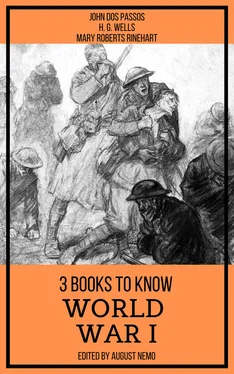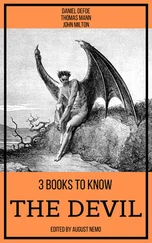––––––––
CHRISFIELD'S EYES WERE fixed on the leaves at the tops of the walnut trees, etched like metal against the bright colorless sky, edged with flicks and fringes of gold where the sunlight struck them. He stood stiff and motionless at attention, although there was a sharp pain in his left ankle that seemed swollen enough to burst the worn boot. He could feel the presence of men on both sides of him, and of men again beyond them. It seemed as if the stiff line of men in olive-drab, standing at attention, waiting endlessly for someone to release them from their erect paralysis, must stretch unbroken round the world. He let his glance fall to the trampled grass of the field where the regiment was drawn up. Somewhere behind him he could hear the clinking of spurs at some officer's heels. Then there was the sound of a motor on the road suddenly shut off, and there were steps coming down the line of men, and a group of officers passed hurriedly, with a businesslike stride, as if they did nothing else all their lives. Chrisfield made out eagles on tight khaki shoulders, then a single star and a double star, above which was a red ear and some grey hair; the general passed too soon for him to make out his face. Chrisfield swore to himself a little because his ankle hurt so. His eyes travelled back to the fringe of the trees against the bright sky. So this was what he got for those weeks in dugouts, for all the times he had thrown himself on his belly in the mud, for the bullets he had shot into the unknown at grey specks that moved among the grey mud. Something was crawling up the middle of his back. He wasn't sure if it were a louse or if he were imagining it. An order had been shouted. Automatically he had changed his position to parade rest. Somewhere far away a little man was walking towards the long drab lines. A wind had come up, rustling the stiff leaves of the grove of walnut trees. The voice squeaked above it, but Chrisfield could not make out what it said. The wind in the trees made a vast rhythmic sound like the churning of water astern of the transport he had come over on. Gold flicks and olive shadows danced among the indented clusters of leaves as they swayed, as if sweeping something away, against the bright sky. An idea came into Chrisfield's head. Suppose the leaves should sweep in broader and broader curves until they should reach the ground and sweep and sweep until all this was swept away, all these pains and lice and uniforms and officers with maple leaves or eagles or single stars or double stars or triple stars on their shoulders. He had a sudden picture of himself in his old comfortable overalls, with his shirt open so that the wind caressed his neck like a girl blowing down it playfully, lying on a shuck of hay under the hot Indiana sun. Funny he'd thought all that, he said to himself. Before he'd known Andy he'd never have thought of that. What had come over him these days?
The regiment was marching away in columns of fours. Chrisfield's ankle gave him sharp hot pain with every step. His tunic was too tight and the sweat tingled on his back. All about him were sweating irritated faces; the woollen tunics with their high collars were like straight-jackets that hot afternoon. Chrisfield marched with his fists clenched; he wanted to fight somebody, to run his bayonet into a man as he ran it into the dummy in that everlasting bayonet drill, he wanted to strip himself naked, to squeeze the wrists of a girl until she screamed.
His company was marching past another company that was lined up to be dismissed in front of a ruined barn which had a roof that sagged in the middle like an old cow's back. The sergeant stood in front of them with his arms crossed, looking critically at the company that marched past. He had a white heavy face and black eyebrows that met over his nose. Chrisfield stared hard at him as he passed, but Sergeant Anderson did not seem to recognize him. It gave him a dull angry feeling as if he'd been cut by a friend.
The company melted suddenly into a group of men unbuttoning their shirts and tunics in front of the little board shanty where they were quartered, which had been put up by the French at the time of the Marne, years before, so a man had told Andy.
“What are you dreamin' about, Indiana?” said Judkins, punching Chrisfield jovially in the ribs.
Chrisfield doubled his fists and gave him a smashing blow in the jaw that Judkins warded of just in time.
Judkins's face flamed red. He swung with a long bent arm.
“What the hell d'you think this is?” shouted somebody. “What's he want to hit me for?” spluttered Judkins, breathless.
Men had edged in between them.
“Lemme git at him.”
“Shut up, you fool,” said Andy, drawing Chrisfield away. The company scattered sullenly. Some of the men lay down in the long uncut grass in the shade of the ruins of the house, one of the walls of which made a wall of the shanty where they lived. Andrews and Chrisfield strolled in silence down the road, kicking their feet into the deep dust. Chrisfield was limping. On both sides of the road were fields of ripe wheat, golden under the sun. In the distance were low green hills fading to blue, pale yellow in patches with the ripe grain. Here and there a thick clump of trees or a screen of poplars broke the flatness of the long smooth hills. In the hedgerows were blue cornflowers and poppies in all colors from carmine to orange that danced in the wind on their wiry stalks. At the turn in the road they lost the noise of the division and could hear the bees droning in the big dull purple cloverheads and in the gold hearts of the daisies.
“You're a wild man, Chris. What the hell came over you to try an' smash poor old Judkie's jaw? He could lick you anyway. He's twice as heavy as you are.”
Chrisfield walked on in silence.
“God, I should think you'ld have had enough of that sort of thing.... I should think you'ld be sick of wanting to hurt people. You don't like pain yourself, do you?”
Andrews spoke in spurts, bitterly, his eyes on the ground.
“Ah think Ah sprained ma goddam ankle when Ah tumbled off the back o' the truck yesterday.”
“Better go on sick call.... Say, Chris, I'm sick of this business.... Almost like you'd rather shoot yourself than keep on.”
“Ah guess you're gettin' the dolefuls, Andy. Look... let's go in swimmin'. There's a lake down the road.”
“I've got my soap in my pocket. We can wash a few cooties off.”
“Don't walk so goddam fast...Andy, you got more learnin' than I have. You ought to be able to tell what it is makes a feller go crazy like that.... Ah guess Ah got a bit o' the devil in me.”
Andrews was brushing the soft silk of a poppy petal against his face.
“I wonder if it'ld have any effect if I ate some of these,” he said.
“Why?”
“They say you go to sleep if you lie down in a poppy-field. Wouldn't you like to do that, Chris, an' not wake up till the war was over and you could be a human being again.”
Andrews bit into the green seed capsule he held in his hand. A milky juice came out.
“It's bitter...I guess it's the opium,” he said.
“What's that?”
“A stuff that makes you go to sleep and have wonderful dreams. In China....”
“Dreams,” interrupted Chrisfield. “Ah had one of them last night. Dreamed Ah saw a feller that had shot hisself that I saw one time reconnoitrin' out in the Bringy Wood.”
“What was that?”
“Nawthin', juss a Fritzie had shot hisself.”
“Better than opium,” said Andrews, his voice trembling with sudden excitement.
“Ah dreamed the flies buzzin' round him was aeroplanes.... Remember the last rest village?”
“And the major who wouldn't close the window? You bet I do!”
Читать дальше












